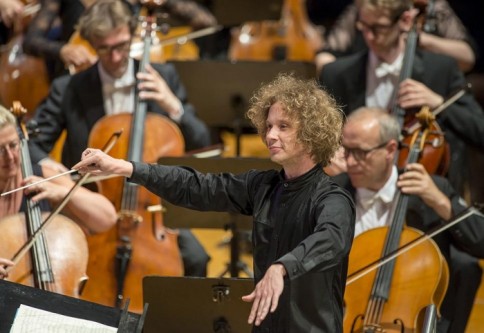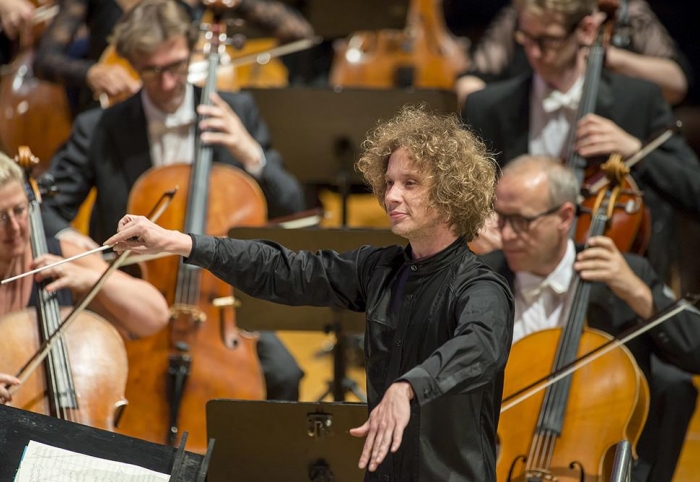 United Kingdom Adams and Stravinsky: Pekka Kuusisto (violin), Philharmonia Orchestra / Santtu-Matias Rouvali (conductor), Royal Festival Hall, London, 30.5.2019. (AS)
United Kingdom Adams and Stravinsky: Pekka Kuusisto (violin), Philharmonia Orchestra / Santtu-Matias Rouvali (conductor), Royal Festival Hall, London, 30.5.2019. (AS)

Adams – The Chairman Dances
Stravinsky – Violin Concerto; Petrushka (1947 version)
This was the first appearance of Rouvali since it was announced that he would become Principal Conductor of the Philharmonia Orchestra from 2021-22, when he will succeed his fellow Finn, Esa-Pekka Salonen. Just to underline the news, a smiling photo of the 33-year-old conductor adorned the cover of this concert programme, with the name SANTTU printed in large capitals above his title-to-be.
For many listeners a little minimalist music goes a long way, as they say, but Adams’s The Chairman Dances is one of the most successful pieces of its kind. The title reflects the composer’s imaginary scenario in which the wife of the legendary Chines tyrant Mao Zedong (Mao Tse-tung) gatecrashes a Presidential banquet and proceeds to dance, her husband stepping out of a hanging portrait of himself to join her. This unlikely flight of imagination has produced music of some colour and personality from the composer. There is a blatant crib from Stravinsky’s Symphony in Three Movements at one point, but the piece as a whole has more variety of rhythm than most minimalist scores, with their relentless chug-chug, and it also has the virtue of brevity.
Having dealt with Adams in a highly efficient manner, the Philharmonia and Rouvali went on to give an immaculate, sharply cut account of Stravinsky’s Violin Concerto, full of personality and character. But what of the soloist, Pekka Kuusisto? Well, it seemed at times as if he were merely playing an obbligato commentary on the orchestral part. His thin tone quality and poor projection of sound were quite inadequate, and moreover he seemed to have little idea of what was needed in terms of rhythmic vitality and a representation of Stravinsky’s bright, neo-classical style. Even the third-movement Aria II, where the soloist gets the chance to display a quality of lyricism within that style, he merely meandered and conveyed no sense of spirituality.
Rouvali had chosen to conduct Stravinsky’s 1947 revision of his 1911 original score of Petrushka. The reduced scoring of the later edition gives the work sharper contours and perhaps therefore an increased sense of drama, but the extraordinary colour of the original is inevitably lost. Apart from some unusual slowings down and inserted commas in the opening tableau, which did little harm, this was a vividly drawn, characterful account of the work, with superlative playing from the orchestra. As you would expect, the programme note described the end of the ballet, in which the ghost of the stabbed Petrushka appears. This concluding section, with its soft ending, contains some of the score’s most imaginative and forward-looking invention. But for some inexplicable reason, unless it was a desire to end the concert with a bang, Rouvali chose to use Stravinsky’s 1947 alternative concert ending, which truncates the work at the end of the Shrovetide Fair dances with a brief mounting string crescendo and a tutti thump. So Petrushka’s ghost made no appearance, to the loss of both the performance and the audience.
As concerts go, this was rather a short one, but Rouvali had a trick up his sleeve. He began his career as a drummer in a rock band and studied the art of percussion. As if to show the orchestra and audience that he didn’t just wave his arms in front of musicians but could actually play something, he strode up to the xylophone, and with the orchestral pianist Elizabeth Burley as accompanist, he proceeding to give a stunningly virtuoso display on that instrument of an arrangement of Vittorio Monti’s Hungarian folk-dance style Csárdás. Predictably this bought the ovation of the evening. Both the Philharmonia and its audiences will surely be in for a lively time when this energetic, charismatic young man takes over his future role.
Alan Sanders
